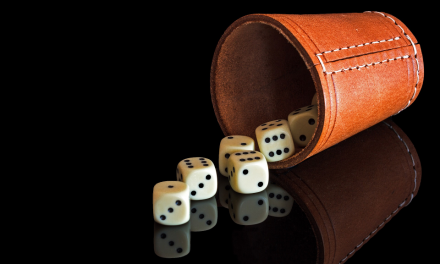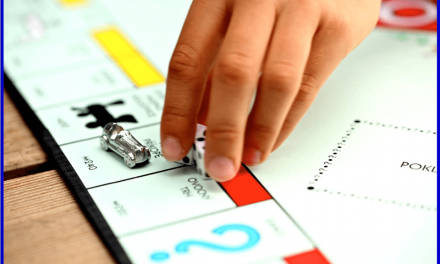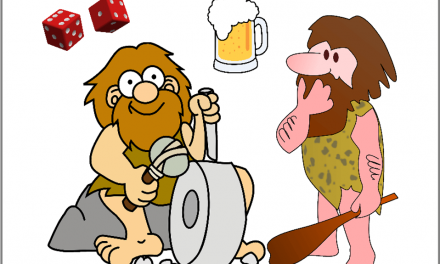In Part 7.C of this series, we presented :
“Like a Man Obsessed” – Dice Collectors Tell Their Story
and we examined several dice collections including one that is listed in the Guinness Book of World Records.
– – –
Today’s post:
You sit down to play what you thought was a heavy RPG and all of a sudden it’s “Attack! Defend! Evade!” 1, 2, 3 – just like that. And you’re left wondering what just happened and why the game is suddenly over and why you’re the one that’s holding the bag.
What do you do in situations like that? When the dice just aren’t running your way?
Or worse yet, what if the dice actually seem to have it in for you?
Every time you roll for anything at all, the dice simply come up wrong. Time after time. Wrong, wrong, wrong.
You never pass, you always fail, and you wanna heave the dice into the nearest corner (where there’s a bin, of course), or down the stairs (ditto), or out the window … and never see them again. Good riddance! You’re better off without them.
Have you ever been right there? Right at the breaking point with a pair of contrary d6’s?
Well, if you have, you’re not alone. The blood you feel rising up inside you has been felt by others before you.
In fact, it’s quite common to be streaky and just as common to blame the dice. And to hate them when they’re against you and love them when they’re not.
In the interest of “science”, let’s call this phenomenon on the part of the dice: “Fickleness” and our reaction to it: the “Fickle Dice Complex” (FDC).
And yet, even with these labels, it’s easy to see that some people’s prejudices toward or against the use of dice in games goes much deeper. In fact, some people are so dead set against dice that we could call them: “Dice Abolitionists”, or DA’s for short.
DA’s tend be perfectionist who, at least in word, want – you guessed it – absolute purity in games with absolutely no element of chance. They are overt min-maxers who may have just a tiny bit more brain power than the rest of us. And, sadly, more phobias and philias than you can shake a stick at – most of the time.
Which, by the way, makes them your ideal playtesters. What? Come again, How’s that?
You see, if your game isn’t broken (which it will be sooner or later) during playtests (where you can usually save face) it will most assuredly be broken after someone has bought it, been dissatisfied, returned the game to the store, and then has hooted and hollered all across the web. About you, your game, and how much you and yours – how should I put this – just absolutely suck!
Better to have it straight up – both barrels – from your local min-maxers even if they seem opinionated.
Trust me on this one. And grow some thick skin. You’re gonna need it when real life people – people you don’t know, will never meet, and can never defend yourself against get – hold of your game. Which they will do in the end, like it or not.
But then, that’s why you design games in the first place, isn’t it? For other people to play? Sure it is.
You should feel honored (as soon as you get over the embarrassment) whenever someone says they hate some aspect of your game. They wouldn’t say a word if they hadn’t at least tried it. Or had a buddy that had tried it. Or … you get the picture.
People have a right to choose and sometimes they choose not to like dice. Maybe these same folks will absolutely love some other aspect of your game. Only time will tell.
Here’s a few random facts about dice haters that I would propose to be near universal:
- Self proclaimed dice haters usually don’t mind using dice to roll up DnD characters, they just dislike dice being used for every-little-tiny thing. For example:
The amount of snowfall (updated every 5 minutes), or
The exact temperature outside (“Is it 20 degrees or 25 degrees in the barn? Milk freezes at 32 just like water, doesn’t it?”), or
What your mage or bard or warrior had for breakfast (“Who cares?” they say, “Let’s get on with the story.”).
- People who hate pattern rolling games (like Yahtzee) don’t actually hate the game so much as they hate the drudgery of waiting for the last guy to finish when they themselves have already figured their own score and everybody else’s (except for that of the slow guy) ten minutes ago.
- DM’s and GM’s run the risk of spawning dice hatred in their groups if they:
1). Never let the other players roll their own dice, or (paradoxically)
2). They always insist that “every player rolls for him or herself”
- Dice, if you’re not careful of how you use them (number of dice, type of dice, target roll, etc.), can produce a wide swing in how they land and therefore in how they are assessed.
In math terms you might call this feature: an excessive “deviation from the norm”.
For example, if your average roll under a given setup is 7, but the extremes are -50 and +50, and there are several hundred or even several thousand ways your dice could land, you might spend all day trying to roll, say, “a 7 plus or minus 2”.
Which is nuts, I know, but the example still holds as being both theoretically possible and comic at the same time.
So, what are your options when people gripe about your dice?
Give them what they want: an alternate way (drawing token from a box or bag, cards form a limited deck, etc.) to inject just enough randomness in the game to mix it up, but not enough to destabilize the game or make it “unstudiable”. Because, really, at the core of the matter, this is what dice haters want.
They want to be able to analyze your game without a Freon-cooled Cray computer. They want to be able to take your game and practically “brute force” analyze it. Take it apart and put it back together again. Which can’t be done easily or (seemingly) even at all when the randomness passes a certain threshold.
What is that threshold?
No one knows for sure but you may get a feel for it:
1). when no two games work out the same way – ever, or
2). if every game seems just alike.
Either way, you can take advantage of these extremes by using like a set of book ends – your solution lies somewhere between them. Who knows, using this bookend method may even help you to nail down some dice mechanic that even dice haters love. 🙂
To illustrate my point (using cards instead of dice), here’s a little tidbit I picked up somewhere along the line:
In a deck of 52 cards, when a group of players set down to play poker, no more than 4 or possibly 5 total wild cards can be used before the game converts from a game of skill to one of pure dumb luck.
Now all we need are standards like that for all our game structures and we’ll never go wrong.
By the way, if you do have an adage like that for some other game or game mechanic or game type, please pass it along so we can share it with others.
Thanks.
And keep on gaming – with or without dice. It’s entirely up to you. 🙂
– – –
In the final of this series we will present :
Dice and More Dice – Concluding Remarks On an Eight Part Series
Here we’ll wrap up our series with a few miscellaneous tidbits and, of course, with your take on dice as well. Just contact us to have your two cents worth included in our concluding remarks.




